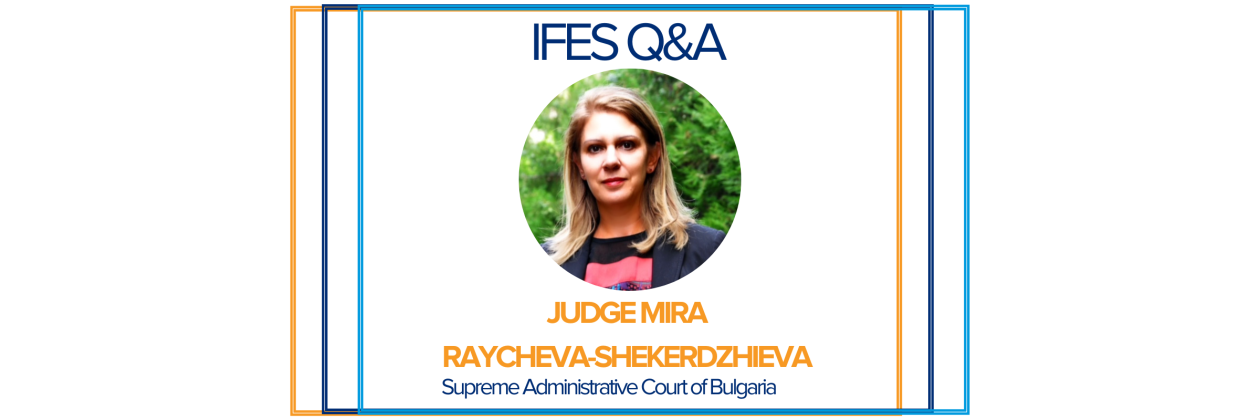
IFES Q&A: Judge Mira Raycheva-Shekerdzhieva
Judge Mira Mihaylova Raycheva-Shekerdzhieva sits on the Supreme Administrative Court of Bulgaria. Earlier this year, Judge Raycheva-Shekerdzhieva gathered with other judges from Europe in Paris, France, during October 2023 as part of the Europe and Eurasia Electoral Justice Network for the Network’s 4th Annual Meeting. The meeting gathered 17 members of judicial and election management bodies from 13 countries and discussed topics such as the independence and integrity of election judges and election management bodies and political finance.
The International Foundation for Electoral Systems (IFES) spoke with Judge Raycheva-Shekerdzhieva about her experience as a woman judge in Bulgaria and how she will carry the knowledge from this network forward into her own work.
Why did you decide to enter a career in the legal profession?
As a matter of fact, I stumbled into the legal profession. When I graduated from high school, I wanted to become a journalist but due to some personal reasons I changed my mind and chose the legal profession. Now I do not regret my choice. The legal profession is remarkable for at least two things. It gives ample opportunities for development in any field, as law has universal pertinence. This art finds application in every aspect of life and is the guarantor of order in society. This is important to me. Practicing law gives me satisfaction because I find my work meaningful. The other thing that distinguishes law from other humanities disciplines is its orderliness. The legal profession is the most exact of the humanities disciplines. Rules always obey logic and that is something that fits my character.
What’s the most challenging part of being a woman in a male-dominated field?
In my country, it cannot be said that the legal profession is dominated by men. Rather, there is gender parity among its practitioners, and the similar number of women and men lawyers corresponds with their equal influence in the profession. An example of this is that many of the law professors are women, also the deans of law schools and senior partners in law firms. The current President of the Supreme Bar Council is a man, but the previous three were women. Many women are also magistrates. Therefore, in my country, it can be said that there is complete and genuine gender equality in the legal profession. All that aside, there is a visible difference in the way men and women practice the profession. Men are less willing to compromise, perhaps more quick, but also less concerned with the consequences of their actions. We are more careful, more willing to compromise, more mindful of the impact that legal techniques can cause not only to litigants but to a wide range of other people. That is why I am inclined to say that we show a face to the profession that seems to inspire more confidence in people.
What’s been the most rewarding part of sitting on the bench?
I can't say it any better than Celsus: "Law is the art of the good and the equitable". It's the profession I love, the one that makes me feel useful, and for the moment I can say that I belong to the few for whom work is also a pleasure. I strive to keep improving precisely so that I can meet the demands of the profession I practice. Working as a lawyer and a judge is both an honor and a reward for me.
What did you learn by gathering with other judges from across Europe?
In more than 25 years of my judicial tenure, I have had many meetings with colleagues, some of them from other countries. I have always found that regardless of the legal systems, the structure of the justice system, the position that colleagues hold in it or the profession they practice, we think in similar ways. This is because law is a universal discipline. It presupposes the solving of similar problems because in every country law has one purpose- to establish in a just manner the order in society and to resolve the disputes arising in it. Interacting with my colleagues has given me the feeling that despite the difference in language, age, and position, we are one family with common goals and common problems. The judicial profession makes me feel part of a large family of like-minded people.
What would your advice be to women who are trying to follow in your footsteps?
I am an example that with perseverance and desire one can achieve success in the profession. I would encourage every woman to try. The road is difficult; it requires a lot of time and effort. It can be said that it is the efforts of my generation that have allowed the legal field in Bulgaria to have full gender equality. Yet I would encourage all women not to give up and to continue what we have done and are doing.






